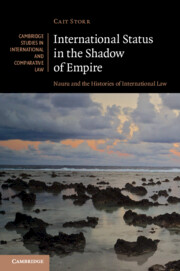Book contents
- International Status in the Shadow of Empire
- Cambridge Studies in International and Comparative Law: 150
- International Status in the Shadow of Empire
- Copyright page
- Contents
- Illustrations
- Acknowledgements
- Prologue
- 1 International Status, Imperial Form: Nauru and the Histories of International Law
- 2 From Trading Post to Protectorate, 1888
- 3 From Protectorate to Colony to Mandate, 1920
- 4 From Mandate to Trust Territory, 1947
- 5 From Trust Territory to Sovereign State, 1968
- 6 After Independence: Sovereign Status and the Republic of Nauru
- Bibliography
- Index
- Cambridge Studies in International and Comparative Law
6 - After Independence: Sovereign Status and the Republic of Nauru
Published online by Cambridge University Press: 20 August 2020
- International Status in the Shadow of Empire
- Cambridge Studies in International and Comparative Law: 150
- International Status in the Shadow of Empire
- Copyright page
- Contents
- Illustrations
- Acknowledgements
- Prologue
- 1 International Status, Imperial Form: Nauru and the Histories of International Law
- 2 From Trading Post to Protectorate, 1888
- 3 From Protectorate to Colony to Mandate, 1920
- 4 From Mandate to Trust Territory, 1947
- 5 From Trust Territory to Sovereign State, 1968
- 6 After Independence: Sovereign Status and the Republic of Nauru
- Bibliography
- Index
- Cambridge Studies in International and Comparative Law
Summary
Chapter 6 is the conclusion of the book. It provides a brief account of the post-independence trajectory of the republic, focusing on the outcomes of the ‘Certain Phosphate Lands Case’ in the International Court of Justice 1992, and the impact of Australia’s offshore detention regime on the rule of law in Nauru in the 2010s. The chapter argues that the now notorious ‘failures’ of the republic identified by the Constitutional Review Committee in 2007 – ‘failure of institutions’; ‘lack of motivation or incentive to preserve wealth for the future, and account for its management’; ‘absence of machinery for enforcing accountability and transparency’; ‘failure of leaders to learn the lessons of good governance’ – must be understood as fundamentally continuous with imperial administrative practices of the pre-independence era, and not as originating with the Nauruan community itself following independence. Noting the reassertion of new forms of imperial intervention in Nauru, the chapter concludes that questions of decolonisation remain as urgent today as they were in 1968.
- Type
- Chapter
- Information
- International Status in the Shadow of EmpireNauru and the Histories of International Law, pp. 244 - 261Publisher: Cambridge University PressPrint publication year: 2020

